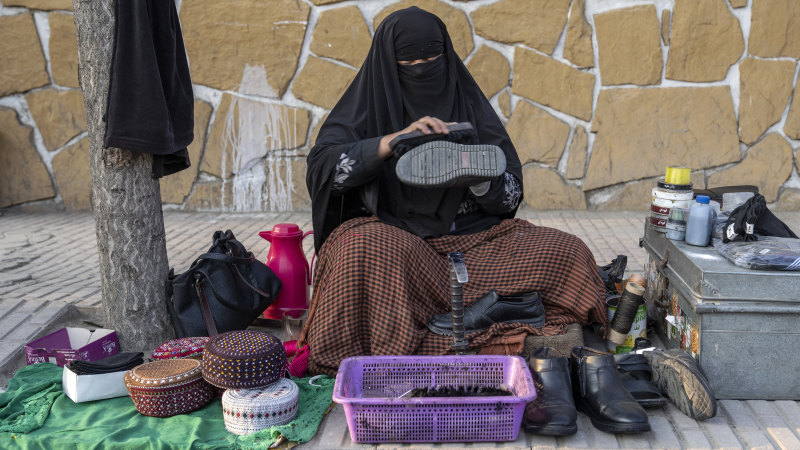
‘We should listen to local voices’: Gillard reflects on Afghanistan failures
May 4, 2023Save articles for later
Add articles to your saved list and come back to them any time.
London: Former prime minister Julia Gillard says failing to listen to local voices to bring about lasting societal change for Afghan women was one of the West’s greatest failures.
The war in Afghanistan lasted two decades and ended in 2021 in humiliation for the American-led coalition, of which Australia was a member, when US President Joe Biden ordered the withdrawal of troops, effectively allowing the Taliban to walk back into Kabul and retake control.
An Afghan woman cleans shoes in a street in Kabul, Afghanistan, last month. After the Taliban came to power in Afghanistan, women have been deprived of many of their basic rights. Credit: AP
The chaotic departure, which left behind thousands of men and women – including aid workers, interpreters and others who had helped the Westerners – is believed to have emboldened Russia’s Vladimir Putin to invade Ukraine, just months later.
The Taliban have used the ensuing relative lack of international interest in Afghanistan to reimpose repressive rules on women, forbidding them to attend high school, exercise in gyms or even enter parks, rolling back 20 years of relative freedom.
On Wednesday, Gillard used her platform as Australia’s first female prime minister and chair of the Global Institute for Women’s Leadership at King’s College London to host a discussion on the issue of women’s rights under the Taliban.
“When I was prime minister the phase that we were in was training Afghan local forces and also a lot of aid development work and I do think that was making a difference, though I absolutely acknowledge from everyone’s perspectives, there was insufficient listening to local voices,” she said.
Left to right: Human rights lawyer Paula Kweskin, activist Sveto Muhammad Ishoq, former Australian prime Minister Julia Gillard, journalist Zahra Joya, and chief correspondent Christina Lamb.Credit: Latika Bourke
“And of the errors that get committed in these various conflicts, the limitations of bringing local people who really have the knowledge and the power and the insight to make a difference to the rebuilding process, I think is very, very telling.
“But I’m very conscious that many Australians did remarkable things in Afghanistan. Some didn’t come home,” she said.
Christina Lamb, a London-based war correspondent with The Sunday Times who specialises in reporting on the effects of conflict on women, said one of the great tragedies of modern-day Afghanistan under the Taliban was that Afghan men were not visibly supporting the few women fighting to reclaim their freedoms, compared to the anti-hijab protests in Iran.
“Men came out on the streets in Iran,” she said. “I am very sad to see. I have been to a number of these protests in Afghanistan, which are very small, men don’t come and that to me is perhaps the biggest single failure of what the West did in Afghanistan.
“It is completely pointless talking to women about rights and educating women and encouraging them to do things if you don’t do anything about the male mindset, and that’s what’s happened in Afghanistan.
“Lots of men in Afghanistan are happy with the situation, the Taliban didn’t come from nowhere.”
Zahra Joya, Afghan journalist and founder of Rukhshana Media, which tells the stories of Afghan women globally, said men were mostly unconcerned by women’s rights.
“During these two years [since the troop withdrawal] men showed how they have a terrible mindset about women,” she said.
“Women, right now, they are alone, they are protesting, they are fighting but men, they are sitting, they have the right to go to work, education, journey … they are enjoying life.
“A small group of men are advocating for women’s rights but it is absolutely not enough,” she said.
She said it was frustrating when the international community sent male-dominated delegations to talk to the Taliban or its proxies.
“We need your real support, please help us and show your solidarity,” she said.
Activist Sveto Muhammad Ishoq, a women’s rights advocate and social entrepreneur, said men were not being as supportive as they should be.
“When it comes to raising their voices and doing something, they just don’t believe it would work,” she said.
This was partly because protesting on the streets was not “culturally appropriate” for Afghans and that a different strategy to motivate male support was needed.
“Activism inside and outside Afghanistan should be different,” Ishoq said.
Women weave wool for making carpets at a traditional carpet factory in Kabul, Afghanistan, last month. Many have lost the freedom to work and study since the Taliban’s return to power.Credit: AP
“We should approach this strategically, especially inside Afghanistan, for example, these few men who do support, we need to mobilise them.
“There needs to be coalition groups built so they will influence other men.
“That’s something we can definitely make happen with the support of the Afghan community and the Afghan diaspora.”
Get a note directly from our foreign correspondents on what’s making headlines around the world. Sign up for the weekly What in the World newsletter here.
Most Viewed in World
From our partners
Source: Read Full Article





